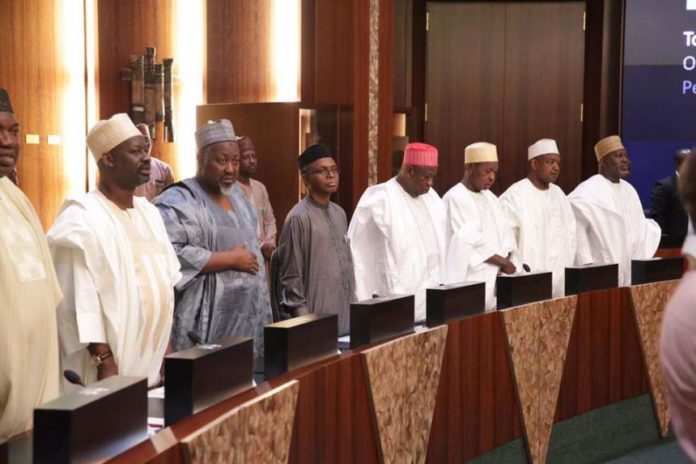By Sampson Ikemitang
There have been hues and cries in the camp of Nigeria’s Governors Forum (NGF) regarding the new national minimum wage of N30, 000 recently recommended by the Ama Pepple – led Tripartite Committee set up by the federal government to fashion out a new minimum wage for the country. Indeed, the Governors have remained insistent that they can only afford to pay N22, 500 hinging their inability to pay the recommended amount on the current economic realities confronting their respective states.
It will be recalled that President Muhammadu Buhari had in 2017 inaugurated the Tripartite Committee comprising the representatives of the federal government, the private sector and the organised labour headed by Ms Ama Pepple, who is former Head of the Civil Service of the Federation to negotiate a new minimum wage for the Nigerian workers. This was against the backdrop that the organised labour demanded a new national minimum wage of N66, 500 for its members.
The organised labour had reasoned that given the worsening cost of living occasioned by inflation, the hitherto minimum wage of N18, 000 was no longer sufficient to afford workers decent living conditions, hence the need for upward review of the minimum wage.
One may recall that the current N18, 000 minimum wage was achieved through a well negotiated Tripartite Structure in 2010 under the leadership of President Goodluck Ebele Jonathan. It was clearly provided in the minimum wage law that subsequent reviews will be done every five years. But as it appears presently, nine years after, the provision has largely remained a wishful thinking.
Considering the situation at hand, a minimum wage is the lowest remuneration that employers can legally pay their workers and the essence in setting this is to ensure that workers are not unduly exploited. However, varied opinions exist about the benefits and drawbacks of minimum wage. Proponents of the national minimum wage are quick to point out that it increases the standard of living of workers, reduces poverty, reduces income inequality and ultimately boosts the morale of workers. In contrast, some opponents of the minimum wage have also argued that it will reinforce the hydra-headed monster of unemployment, given the fact that many small businesses would be forced to lay off workers in a bid to hold down the overall labour costs.
Be that as it may, it is instructive that we take a look at the practices by other countries operating a federal system of government, especially pertaining to the issue of minimum wage with a view to borrowing a leaf. For instance, The United States’ current national minimum wage is $7.25 per hour, whereas many of its States and Cities have their own minimum wage. This system offers their employees the option of receiving whichever is higher, the federal or local minimum wage, says Kimberly Amadeo in her article of 2018 published on the website: www.thebalance.com
A cursory look at Amadeo’s analyses on the United States minimum wage by States revealed that in 21 States, the minimum wage equals the federal level, whilst the remaining 29 States and the District of Columbia set rates above the federal level. She noted that the District of Columbia for instance has the highest minimum wage of $13.25 per hour which is almost twice the federal minimum wage of $7.25 per hour.
Again, the Washington State’s minimum wage is $11.50 an hour and Massachusetts and California have mandated $11.00 an hour. Further, some cities in California have higher minimum wages, just as in Emeryville, the minimum wage is $15.69/hour. In San Francisco, it is $15 per hour. Oregon pays $10.75 per hour, while Vermont and Arizona pay $10.50 an hour. Others are New York which pays $10.40 an hour; Colorado pays $10.20 an hour, Hawaii, Maryland, Connecticut and Rhode Island pay $10.10 an hour and Maine pays $10 an hour as reported Kimberly.
She later mentioned that four States pay more than $9 an hour: Alaska at $9.84, Minnesota at $9.65, Michigan at $9.25, and Nebraska at $9.00. Adding, four States pay more than $8.50 an hour: South Dakota at $8.85, West Virginia at $8.75, New Jersey at $8.60, and Arkansas at $8.50, Ohio and Montana pay $8.30 an hour, whilst States like Delaware, Illinois, Nevada and Florida pay $8.25 an hour, among others.
A comparative analysis of the US minimum wage vis-a-vis other countries across Europe from my investigation has revealed that Canada has no minimum wage. Instead, each province and territory sets its own level which range from a low of C$11.00 or US$8.45 per hour; Nova Scotia and Alberta pay C$15.00 or US$11.52 per hour. Nevertheless, it is evident that the national government is trying to get all of them to set a minimum wage of C$12 per hour, the equivalent of US$9.22/hour.
A similar atmosphere exists in Mexico where there is also no national minimum wage. Here, a commission sets the minimum wage for the highest paid zone. The wage which is 80.04 pesos a day or $4.25 per day is far below what any worker receives; therefore it is used only as the base for negotiations.
In China, the situation is not different. There is no national minimum wage because the cost of living varies so much across the country. Instead, each province sets its own level with a general guidance given by the national government. For instance, Shanghai’s minimum wage is 2, 420 RMB per month or US$382.67/month. India too has no national minimum wage. But, its Minimum Wage Act of 1948 said that States must negotiate with businesses to agree with a living wage. For example, the minimum wage in Delhi is 534 rupees/day or US$7.37 per day, says Kimberly.
Unlike what obtains in the US and other European countries, South Africa has a national minimum wage, since its National Minimum Wage Act (NMWA) set a mandatory national minimum wage at 20 South Africa rand (ZAR) equivalent to US$1.44 for each hour worked. The NMWA states that all employees are entitled to receive and all employers are required to pay wages no less than the national minimum wage. However, the South African national minimum wage is not uniform in application, considering the fact that the NMWA imposes lower minimum wage rates for farm workers, domestic workers, and persons engaged in expanded public works programmes.
Ethiopia, on the other hand, has no national minimum wage. Some government institutions and public enterprises set their own minimum wages. The public sector employees are the largest group of wage earners with a monthly minimum wage of 420 birr ($21), and the banking and insurance sectors have a minimum monthly wage of 336 birr ($18).
In view of the above, it is agreeable that the 36 States of the federation and the Federal Capital Territory should be allowed to determine the minimum wage for their workers. To achieve this, the 1999 Constitution, (as amended) must be further amended to devolve more power to the States, allowing them to exploit the mineral resources in their domain to develop at their own pace.
Besides, the minimum wage issue must be moved from the Exclusive Legislative List in the second schedule of the 1999 Constitution, as amended, to the Concurrent Legislative List where both the federal and state governments can legislate and enact their minimum wage laws that will reflect their economic peculiarities.
Undeniably some States in the recent past were indebted to their workers for months because they were unable to pay the N18, 000 minimum wage, until the federal government stepped in and released the bailout funds before the situation was salvaged. There may be another disaster in waiting if the N30, 000 minimum wage is imposed on the states without considering the different conditions under which they operate. In fact, the consequences will be far reaching as wage growth is a hindrance to employment creation.
Sampson Ikemitang writes from the Federal Ministry of Information and Culture, Abuja via E-mail: sampsonikemitang@gmail.com






